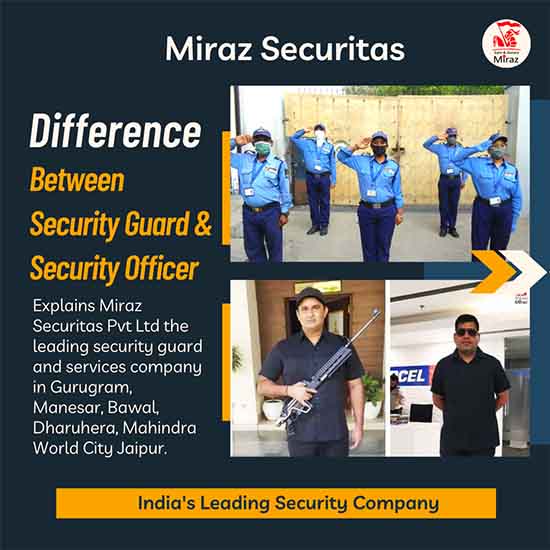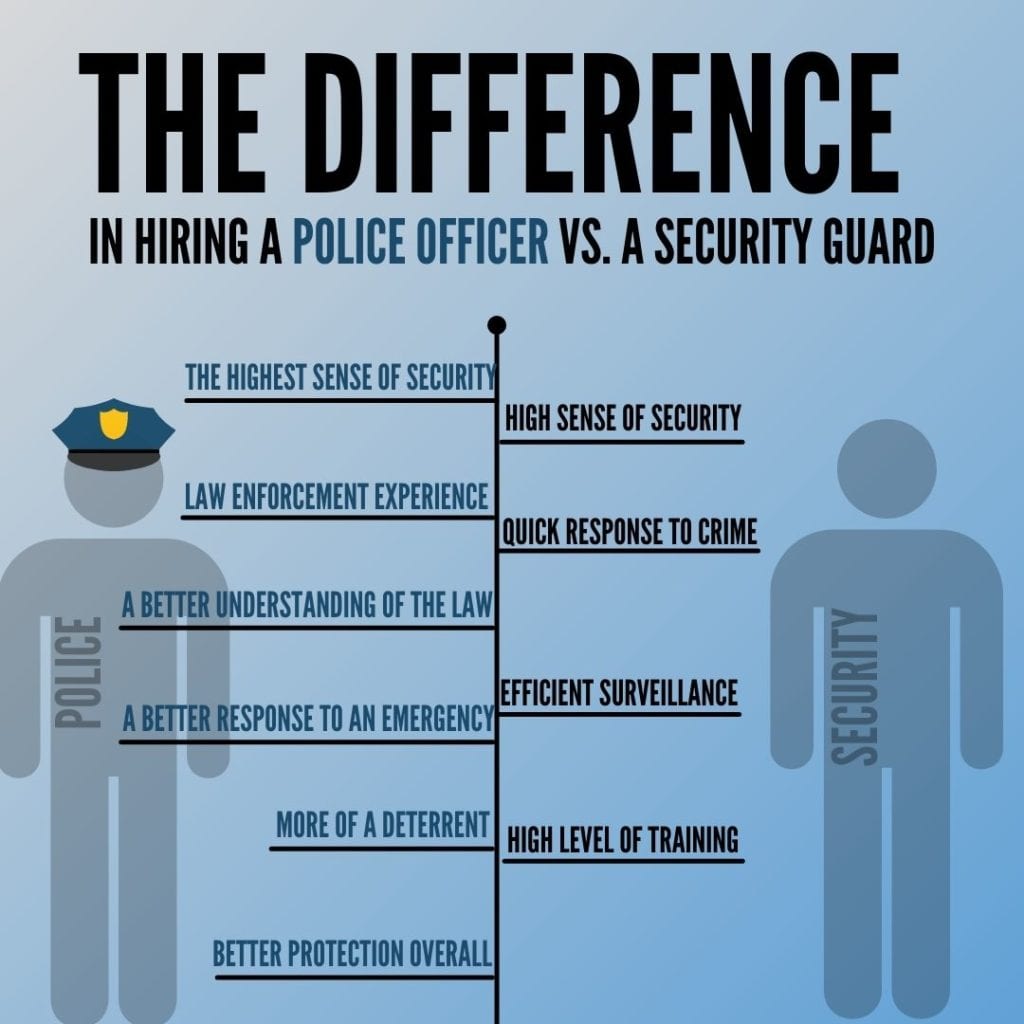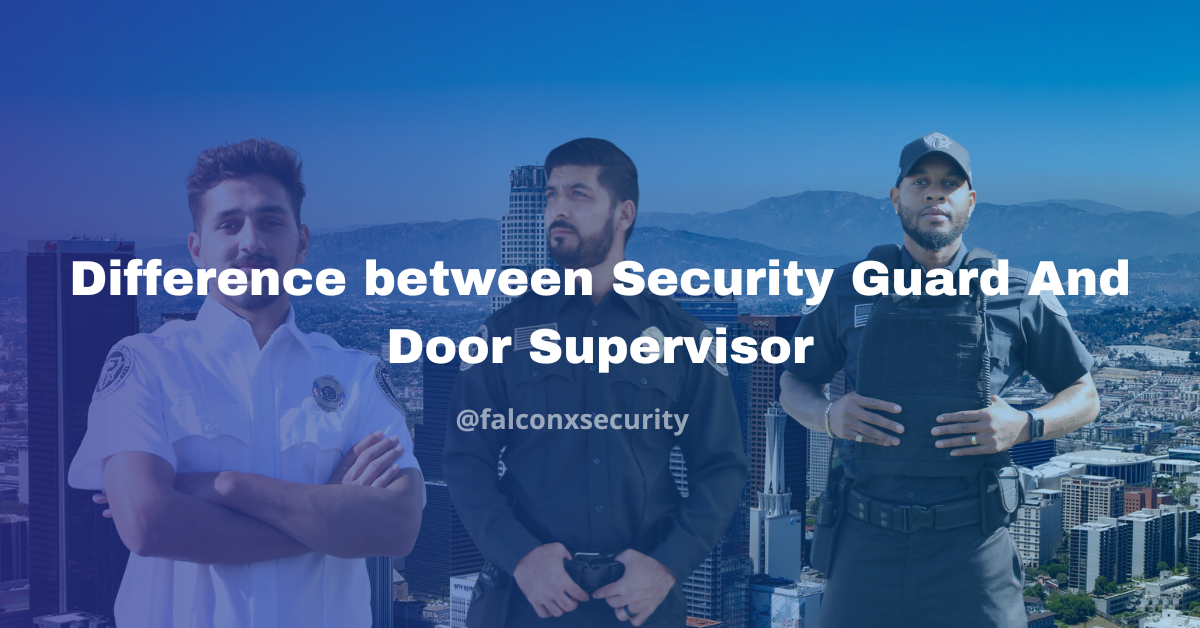A security guard typically carries out basic tasks, while a security officer has more extensive training and responsibilities. Security guards are often hired to monitor premises and deter potential threats, while security officers are trained to handle more complex security situations and emergencies.
Both play crucial roles in maintaining safety and security in various settings, such as residential complexes, retail establishments, or events. Understanding the key differences between security guards and security officers can help businesses and individuals make informed decisions when hiring security personnel.
We will delve deeper into the distinctions between these two security roles and highlight the unique skills and responsibilities associated with each position.
Credit: smartsecuritypros.com
Introduction To Security Roles
Security plays a crucial role in safeguarding people, property, and assets. When it comes to maintaining safety and order, security guards and security officers are often at the forefront. Although the terms “security guard” and “security officer” are sometimes used interchangeably, they actually refer to different roles within the security industry. In this blog post, we will explore the differences between security guards and security officers, starting with the basics of each role.
Security Guard Basics
A security guard is an individual responsible for protecting a specific location or property. Security guards are typically employed by private companies, government agencies, or organizations that need to maintain a secure environment. They may work in various settings such as residential areas, shopping malls, banks, or construction sites.
Security guards perform a wide range of duties, including patrolling the premises, monitoring surveillance cameras, and inspecting access points. They are trained to detect and report any suspicious activities, respond to emergencies, and provide assistance to individuals in need. In some cases, security guards may also enforce rules and regulations, such as checking identification or conducting bag checks.
Key responsibilities of a security guard:
- Patrolling the premises to deter and detect unauthorized activities
- Monitoring surveillance cameras and alarm systems
- Responding to emergencies and providing first aid if necessary
- Assisting visitors and employees with inquiries or concerns
Security Officer Fundamentals
A security officer, on the other hand, is a more comprehensive role that encompasses the responsibilities of a security guard and extends beyond. Security officers are often employed by larger organizations or government agencies that require a higher level of security measures.
In addition to the duties performed by security guards, security officers may also be responsible for developing and implementing security protocols, conducting risk assessments, and managing security systems. They may supervise a team of security guards and ensure that all security measures are properly executed.
Key responsibilities of a security officer:
- Developing and implementing security protocols
- Conducting risk assessments and identifying potential vulnerabilities
- Managing security systems, such as access control or CCTV
- Supervising and training security personnel
In conclusion, while security guards focus on protecting specific locations and maintaining order, security officers have a broader scope of responsibilities that involve strategic planning and management of security measures. Both roles are essential in ensuring the safety and security of people and assets.
Key Responsibilities
When it comes to security, the roles of security guards and security officers are often used interchangeably. However, there are distinct differences in their key responsibilities. Understanding these differences is crucial for businesses and organizations in determining their security needs. Let’s delve into the key responsibilities of security guards and security officers, focusing on their on-the-ground duties and strategic functions.
On-the-ground Duties Of Security Guards
Security guards are primarily responsible for maintaining a visible presence and patrolling a designated area to prevent and detect signs of intrusion, fire, or other hazards. They often monitor surveillance equipment, inspect buildings and control access points. Their duties also include responding to alarms and incidents, providing customer service, and documenting any security-related occurrences. In addition, security guards may enforce regulations and ensure compliance with company policies.
Strategic Functions Of Security Officers
On the other hand, security officers are involved in more strategic functions, such as developing and implementing security policies and procedures. They conduct risk assessments, analyze security data, and devise security plans to mitigate potential threats and vulnerabilities. Security officers also collaborate with management to create emergency response protocols and provide training to staff on security measures. They may oversee security operations, manage security personnel, and liaise with law enforcement agencies when necessary. Furthermore, security officers often play a key role in conducting investigations and gathering evidence related to security breaches or incidents.
Required Skills And Competencies
When it comes to the security industry, both security guards and security officers play crucial roles in ensuring safety and protection. Understanding the required skills and competencies for these positions is essential for aspiring professionals.
Physical And Technical Skills For Guards
- Physical fitness and stamina
- Observation and surveillance abilities
- Basic knowledge of security systems
- Emergency response skills
Management And Operational Skills For Officers
- Leadership and decision-making capabilities
- Effective communication and conflict resolution
- Knowledge of security protocols and procedures
- Ability to analyze and assess security risks

Credit: miraz-securitas.com
Training And Certification
Security guards are generally employed to protect properties, assets, and people. They are usually unarmed and may have limited training. A security officer, on the other hand, is a trained professional who has been certified to perform a wider range of duties such as monitoring surveillance equipment, responding to emergencies, and enforcing laws.
Security guards and security officers are two distinct roles that require different levels of training and certification. While both positions involve ensuring the safety and security of people and property, the responsibilities and requirements for each vary significantly. In this article, we will explore the differences between the two and focus on the training and certification required for each role.
Standard Training For Security Guards
Security guards are typically responsible for monitoring and patrolling a specific area, such as a shopping mall or office building, to ensure the safety of people and property. The training for security guards is usually less comprehensive than that of security officers and can vary depending on the state or country. However, most security guard training programs cover the following topics:
- Basic security procedures and protocols
- Emergency response and crisis management
- Report writing and documentation
- Communication and customer service
Advanced Certification For Security Officers
Security officers, on the other hand, have a more specialized and advanced role, which requires more extensive training and certification. Security officers are responsible for managing security operations, conducting investigations, and providing expert security advice to clients. The certification for security officers is usually more rigorous than that of security guards and can include the following:
| Training Areas | Certifications |
|---|---|
| Legal aspects of security | Certified Protection Professional (CPP) |
| Security risk assessment | Physical Security Professional (PSP) |
| Investigations | Professional Certified Investigator (PCI) |
| Executive protection | Board Certified in Security Management (BCSM) |
In conclusion, the training and certification requirements for security guards and security officers are different due to their respective roles and responsibilities. While security guards require standard training, security officers need advanced certification to perform their duties effectively. Therefore, it is crucial for businesses and organizations to understand the differences between the two positions and ensure that they have the right personnel to address their security needs.
Work Environment And Conditions
When it comes to the work environment and conditions, there are notable differences between security guards and security officers. These differences can impact the day-to-day tasks and responsibilities of individuals working in these roles.
Frontline Operations For Guards
Security guards typically work in frontline operations, where they are responsible for maintaining a visible presence and ensuring the safety and security of a specific location. This can include duties such as patrolling designated areas, monitoring surveillance cameras, and responding to incidents or emergencies.
Guards often work in various settings, such as shopping malls, airports, hospitals, or office buildings. They are required to be on their feet for long periods, which can be physically demanding. Additionally, guards may need to work outdoors in all weather conditions, making adaptability and resilience crucial qualities for this role.
Furthermore, security guards may be required to work irregular hours, including nights, weekends, and holidays, as security is needed around the clock. This aspect of their work can lead to potential disruptions in their personal lives and requires a high level of dedication.
Behind-the-scenes For Officers
On the other hand, security officers often work in behind-the-scenes roles, focusing on planning, coordination, and management of security operations. They are responsible for developing security protocols, conducting risk assessments, and implementing strategies to mitigate potential threats.
Security officers typically work in an office environment, where they can analyze data, review security reports, and collaborate with other personnel to ensure effective security measures. They may also be involved in training security staff or conducting investigations into security breaches or incidents.
Unlike security guards, officers may have more regular working hours, typically following a standard 9-to-5 schedule. This allows for a more predictable work routine and a better work-life balance.
In conclusion, while security guards primarily focus on frontline operations, security officers handle more administrative and managerial tasks. These differences in work environment and conditions can significantly impact the day-to-day experiences of individuals in these roles, requiring unique skill sets and adaptability.
Career Path And Progression
Individuals who are interested in pursuing a career in the security industry often wonder about the difference between a security guard and a security officer. While the two roles share similarities, there are a few key differences to keep in mind. One of the main differences is in their career path and progression.
After gaining some experience as a security guard, you can advance to a security officer position. Security officers have more responsibilities than security guards. They are responsible for managing and supervising security guards, developing security plans, and implementing security measures.
Security officers also need to have excellent communication skills to interact with clients, law enforcement, and other stakeholders. They should have a good understanding of the security industry’s best practices and have experience working in the field.
Overall, starting as a security guard and advancing to a security officer position requires dedication, hard work, and experience. However, with the right training and experience, you can have a successful and fulfilling career in the security industry.
Legal And Ethical Considerations
Compliance Requirements
Security guards and security officers are both subject to legal compliance requirements as mandated by state and federal laws. These regulations dictate the necessary qualifications, training, and licensing needed to perform security duties. Security personnel must adhere to specific guidelines regarding the use of force, detention of individuals, and protection of property. Furthermore, they must stay updated on changes in legislation to ensure ongoing compliance.
Ethical Responsibilities In Security Roles
Ethical responsibilities are integral to the roles of security guards and officers. They are entrusted with the safety and well-being of individuals and property, necessitating a high level of integrity and accountability. Security personnel must act ethically in all situations, demonstrating respect for human rights, confidentiality, and privacy. They are also expected to conduct themselves with honesty, fairness, and professionalism at all times, upholding the trust placed in them by clients and the public.
Real-world Examples
Case Studies Of Security Guards
Security guards play a crucial role in maintaining safety and security in various settings. Let’s explore some real-world case studies that highlight the responsibilities and challenges faced by security guards.
Profiles Of Successful Security Officers
Successful security officers demonstrate exemplary skills and qualities that set them apart in the field. Let’s delve into real-life profiles of security officers who have excelled in their roles, showcasing their expertise and dedication.

Credit: offdutypoliceofficers.com
Frequently Asked Questions
What Is The Difference Between A Guard And A Security Officer?
A guard provides basic protection and surveillance, while a security officer has more advanced training and authority to handle potential threats. Guards typically work in lower-risk environments, while security officers are employed in higher-risk settings like airports or government buildings.
What Is The Role Of A Security Officer?
A security officer is responsible for maintaining safety and security in a particular area or premises. They monitor and patrol the area, check for any suspicious activities, and investigate any security breaches or incidents. They also ensure that all security protocols and procedures are followed and may provide assistance to emergency services if needed.
What Is A Security Officer Called?
A security officer is often called a guard or security guard. They are responsible for protecting people and property.
What Is The Difference Between a Safety Officer And a Security Guard?
A safety officer focuses on preventing accidents and ensuring compliance with safety regulations. A security guard is responsible for protecting property and people from theft and vandalism.
Conclusion
While security guards and security officers share similar responsibilities, their roles differ in terms of training and authority. Understanding the distinction between the two positions is crucial for businesses seeking to enhance their security measures. By recognizing the unique contributions of each role, organizations can effectively bolster their security protocols and ensure a safe environment for employees and patrons alike.




Leave a Reply